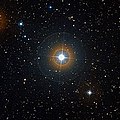In astronomy, a corona (pl.: coronas or coronae) is the outermost layer of a star's atmosphere. It is a hot but relatively dim region of plasma populated...
62 KB (7,712 words) - 02:41, 19 June 2025
Look up corona or Corona in Wiktionary, the free dictionary. Corona (from the Latin for 'crown') most commonly refers to: Stellar corona, the outer atmosphere...
6 KB (784 words) - 11:46, 10 November 2024
These high-energy stellar winds blow stellar wind bubbles. G-type stars like the Sun have a wind driven by their hot, magnetized corona. The Sun's wind...
5 KB (591 words) - 22:22, 21 June 2025
and titanium oxide. The outermost part of the stellar atmosphere, or upper stellar atmosphere, is the corona, a tenuous plasma which has a temperature above...
7 KB (824 words) - 11:02, 24 June 2025
Coronavirus (redirect from Corona virus)
image reminiscent of the stellar corona, from which their name derives. The name "coronavirus" is derived from Latin corona, meaning "crown" or "wreath"...
96 KB (10,611 words) - 20:30, 27 May 2025
magnetic field lines that stretch out into the stellar corona. These in turn serve to heat the corona to temperatures over a million kelvins. The magnetic...
22 KB (2,725 words) - 23:59, 23 June 2025
Star (redirect from Stellar radius)
Light from a Hot Stellar Corona Detected with the VLT" (Press release). ESO. 1 August 2001. Retrieved 10 July 2006. "What Is the Sun's Corona? | NASA Space...
148 KB (16,464 words) - 01:06, 28 June 2025
Coronavirus diseases (redirect from Corona virus disease)
shape resembling a stellar corona, such as that of the Sun visible during a total solar eclipse; corona is derived from Latin corōna 'garland, wreath,...
23 KB (1,938 words) - 19:42, 17 July 2025
1944, Walter Baade categorized groups of stars within the Milky Way into stellar populations. In the abstract of the article by Baade, he recognizes that...
35 KB (3,543 words) - 02:06, 15 July 2025
Stellar parallax is the apparent shift of position (parallax) of any nearby star (or other object) against the background of distant stars. By extension...
22 KB (2,795 words) - 23:04, 22 May 2025
Compact object (redirect from Stellar Remnant)
Compact objects are often the endpoints of stellar evolution and, in this respect, are also called stellar remnants. They can also be called dead stars...
20 KB (2,589 words) - 23:25, 24 June 2025
completely obscures the bright light of the Sun, allowing the much fainter solar corona to be visible. During an eclipse, totality occurs only along a narrow track...
87 KB (8,984 words) - 04:21, 5 June 2025
telescopes is the basis for many fields of astronomy, including photometry and stellar spectroscopy. Hipparchus did not have a telescope or any instrument that...
14 KB (1,695 words) - 21:03, 7 June 2025
In astrophysics, stellar nucleosynthesis is the creation of chemical elements by nuclear fusion reactions within stars. Stellar nucleosynthesis has occurred...
38 KB (4,506 words) - 10:33, 11 July 2025
corona and lack a convection zone in their outer atmosphere. They have a higher mass loss rate than smaller stars such as the Sun, and their stellar wind...
13 KB (1,390 words) - 20:00, 24 July 2025
separating a star's corona from the stellar wind defined as where the coronal plasma's Alfvén speed and the large-scale stellar wind speed are equal...
15 KB (1,570 words) - 03:08, 16 June 2025
Young stellar object (YSO) denotes a star in its early stage of evolution. This class consists of two groups of objects: protostars and pre-main-sequence...
5 KB (616 words) - 03:44, 24 June 2025
St. Elmo's fire (redirect from Saint elmo's fire and corona)
appears in a Michigan valley Plasma globe – Decorative electrical device Stellar Corona – Outermost layer of a star's atmosphere Triboelectric effect – Charge...
47 KB (6,055 words) - 08:31, 21 July 2025
Stellar structure models describe the internal structure of a star in detail and make predictions about the luminosity, the color and the future evolution...
15 KB (2,089 words) - 21:20, 1 October 2024
Features Baily's beads (diamond ring) Shadow bands Solar prominence Stellar corona helmet streamer Lists of eclipses Total/hybrid eclipses → next total/hybrid...
8 KB (991 words) - 01:49, 10 June 2025
Bayer, Flamsteed, HR, or Draper (not from the supplements) designation. Stellar extremes or otherwise noteworthy stars. Notable variable stars (prototypes...
7 KB (415 words) - 13:08, 31 July 2025
dwarfs, and white dwarfs which are much more common, the latter being stellar remnants). A G-type main-sequence star with the mass of the Sun will fuse...
14 KB (1,278 words) - 08:55, 29 July 2025
this particular scenario would be the more intense light and the shorter stellar lifespan of the home star. F-type stars are known to emit much higher energy...
11 KB (1,186 words) - 20:00, 19 July 2025
Features Baily's beads (diamond ring) Shadow bands Solar prominence Stellar corona helmet streamer Lists of eclipses Total/hybrid eclipses → next total/hybrid...
25 KB (1,977 words) - 21:23, 2 August 2025
A stellar core is the extremely hot, dense region at the center of a star. For an ordinary main sequence star, the core region is the volume where the...
15 KB (1,839 words) - 04:37, 6 June 2025
Star formation (redirect from Stellar nursery)
Observatory. For low-mass stars X-rays are generated by the heating of the stellar corona through magnetic reconnection, while for high-mass O and early B-type...
49 KB (5,725 words) - 10:15, 11 July 2025
Apparent magnitude (redirect from Stellar magnitude)
1×1014 kilometres; 1.9×1014 miles). Therefore, it is of greater use in stellar astrophysics since it refers to a property of a star regardless of how...
67 KB (4,848 words) - 02:41, 19 July 2025
Star count, survey of stars E. Mamajek (2022-04-16). "A Modern Mean Dwarf Stellar Color and Effective Temperature Sequence". Retrieved 2022-05-14. Steigerwald...
13 KB (1,414 words) - 19:02, 19 July 2025
A stellar-wind bubble is a cavity light-years across filled with hot gas blown into the interstellar medium by the high-velocity (several thousand km/s)...
2 KB (217 words) - 14:09, 28 December 2024






















